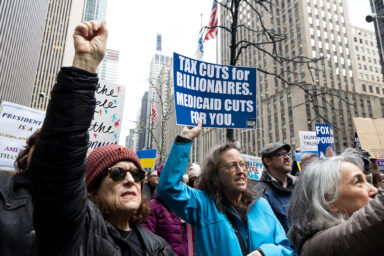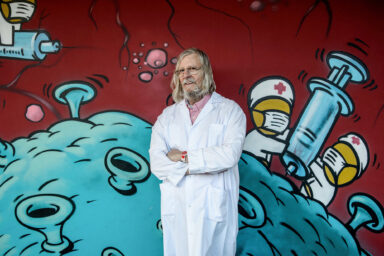When Broadway announced its shutdown in March, seamstress Amy Micallef decided to use her talents to sew thousands of masks to donate.
From Toledo to Tennessee, Atlanta to Alaska, an army of anonymous, unheralded volunteers is toiling in spare bedrooms or basements, manufacturing a simple product they hope will save hundreds of thousands of lives.
There is near-universal agreement that cloth face masks can help prevent the spread of COVID-19. It’s easy to find masks, but there’s a catch: Mostly, they’re not free.
A search for “cloth masks” on eBay will produce close to 100,000 listings.The same search on the New York City page for Craigslist produced 29 pages of results, some from as far away as Los Angeles.
But nobody was giving them away.
When the CDC began recommending mask-wearing for the general public, many entrepreneurs jumped on the bandwagon, sewing masks to turn a profit on an item in high demand. They saw an opportunity to make a quick buck — but Broadway seamstress Amy Micallef saw an opportunity to do good.
Out of work, along with hundreds of other on- and offstage employees, when New York’s theaters shut down on March 12, Micallef put her idle hands to work. Instead of constructing costumes for numerous productions of Hamilton, tailoring for celebrities, and working in the wardrobe departments of some of the biggest shows on Broadway, seamstress Micallef now found herself at home in her Inwood apartment, creating attractive and highly effective cloth masks to donate to those in need.
Three sewing machines, a closet full of supplies, and a string of vibrant fabric pieces flow from one room into the next; her “workstation” has officially taken over her entire apartment. While she can’t work on Broadway, she can use her years of sewing experience to provide masks for essential workers and others.
“I can keep up with the demand and I’ve got the time and fabric,” said Micallef. “So why not. It’ll send out some good karma, I guess.”
Micallef’s unusual skills allow her to produce high-quality masks in a fraction of the time it would take others. Because she works in large batches, she can make dozens of masks in a single day.

She works for a minimum of eight hours per day, blasting an eclectic collection of CDs as she sews. Sometimes Micallef watches reruns of formulaic TV shows, providing her with a way to measure how long she’s been working. As requests continue to increase, Micallef’s days are stretched longer and longer.
For Micallef, the call to aid healthcare workers is personal. In 2007, her father, Chuck, underwent a diverticulitis surgery, and the next day, he was rushed back for emergency surgery due to complications from the original procedure, causing him to lose his spleen, appendix, and colon.
Micallef and her mother spent the next several days sleeping in the ICU. The ways in which doctors and nurses showed their support for her family during that difficult time made a lasting impact on Micallef.
While she claims there is no way to repay those healthcare workers for all of their help then and now, Micallef knows that many hospitals still need masks to wear over N95 respirators. While staying inside and doing her part to lessen the spread of COVID-19, Micallef has provided hundreds of cloth masks to hospitals taking donations.

For healthcare workers in the emergency department of Hackensack Meridian University Medical Center, the mask shipment could not have come at a better time. While cloth masks are not used during patient care, they were distributed among staff to wear outside of work. After working long shifts in the emergency room, the staff was relieved to have this more comfortable, essential item provided for their personal time.
“We didn’t have much time outside of the hospital,” said Dr. Kameno Bell. “Everyone was called in to help, so it’s not like I was going to leave the hospital to go out shopping. It really allowed us to concentrate on the task at hand and not have to go out and look for masks.”
While many question the effectiveness of cotton masks, CDC resources reference a study reporting that COVID-19 is transmittable through respiratory droplets that can potentially travel up to 13 feet. While the CDC does not mandate face coverings, Gov. Andrew Cuomo’s Executive Order No. 202.17, which went into effect April 17, requires that New Yorkers wear face coverings outside their homes. After this order was signed, even more requests for Micallef’s masks came flooding in.
Micallef uses multiple layers of cotton with a high thread count. After working with various textiles in her career, Micallef is convinced that cotton is the safest mask material.
She warns against using alternate materials like neoprene. “Neoprene doesn’t breathe at all, so you’re taxing your lungs unless it has a respirator,” said Micallef. “Not to mention, it’s a petroleum product.” Petroleum products are notoriously damaging to respiratory tissue, she says.

After completing several hospital shipments, Micallef looked to donate her masks to nonprofits in her community. Two organizations, Graham Windham and Harlem United, are distributing supplies to people in high-risk groups, including children in foster care, the unemployed, and New York City’s homeless population. Both organizations are seeking mask donations, and Micallef is working hard to provide them with 2,000 in total.
Micallef’s masks are distinguished by the vibrant hues and colorful patterns of her fabrics.
“When doctors are wearing masks, you can still see their eyes, but you can’t see a smile, or a frown, or anything else,” said Micallef. “It’s dehumanizing; but if you pick a fun fabric, not only does it help the doctors and nurses, it’s also a positive feeling for the people they’re treating.”
Micallef’s fun, funky masks made an immediate impact on the children living in-residence in Graham Windham’s facilities.
“Her designs were so great that there was a real excitement, and it made mask-wearing cool pretty quick,” said Jess Dannhauser, president and CEO of Graham Windham. “Everyone’s eyes lit up, and different people gravitate toward different patterns, and it was really fun to see what they chose.”
In addition to her work on Broadway, Micallef has also worked as a celebrity tailor since 2017. When she began reaching out to friends and family in April to see if they needed masks, she also contacted several of her previous clients to ask about masks for their families. While filming in Australia, Grey’s Anatomy star Kate Walsh informed Micallef that her assistant had been diagnosed with COVID-19. Immediately, Micallef shipped 100 masks down to Australia.

“They’re so festive and joyful, and they’re sort of emblematic of who she is,” said Walsh. “She has such a whimsical aspect to her that is just so infectious and evident in these masks.”
Walsh herself recently participated in livestreamed play readings on Play Per View to raise money for charity, and while doing her part to give back to the community, she acknowledges what makes Micallef’s work so unique.
“I know there’s a big fashion push with designers making masks, but this is all donated and from her own desire to help people,” said Walsh. “That should be celebrated.”
Several Facebook groups for seamsters have surfaced within recent months, including Mask Makers Community, which has over 10,000 members; mask-making is becoming its own subculture. While the demand for masks continues to increase and online sellers continually sell out, Micallef produces them without charge. She purchases all supplies out-of-pocket because she is financially able.
Several fabric companies have allowed Micallef to buy wholesale. After sending an inquiry to FreeSpirit Fabrics explaining her situation, she received a response asking for her shipping address. The next thing she knew, fabric — free of charge — was at her front doorstep.
The Reopening: How to Doll Up Dining During Social Distancing
While Micallef can afford to create these masks for free, she recognizes that not every seamster is in the same position. She made it clear that there is no right way for anyone to be spending their time in quarantine.
“Could I sit in my apartment and just read a bunch of books and knit? Yes. Is that wrong of me to do? No. Live your own life, but this is something I can do, and it’s something I will do,” she said.
Since March, Micallef has received requests for a collective 3,270 masks and is nearly finished. By the time she completes all of them, she will have used enough fabric to span the length of three football fields. With talk of a second wave as the pandemic progresses, Micallef knows that the completion of her current requests will not signify the end of her volunteer work. As long as people continue to need masks, she will continue to sew.
“It seems like there’s still such a great demand and that I’m just not working fast enough,” said Micallef. “I’m glad I can contribute. I’m just happy to help in any way possible.”
Related front page panorama photo credit: Adapted by WhoWhatWhy from Amy Micallef.



